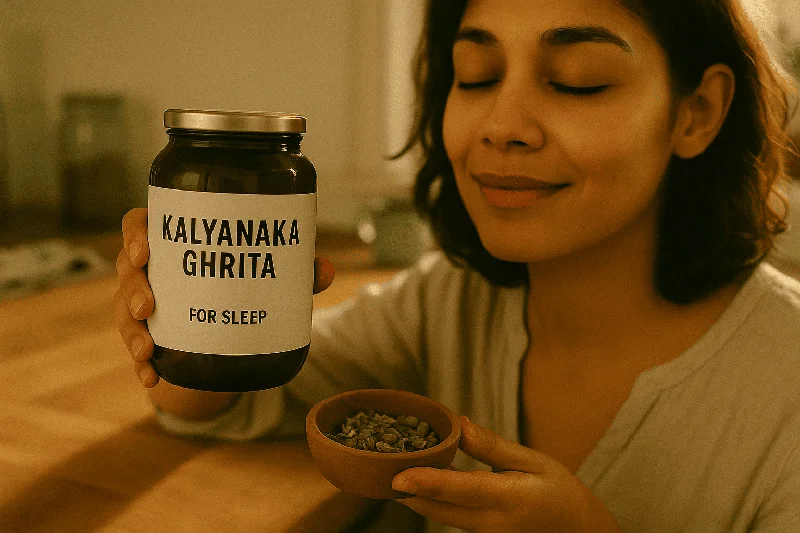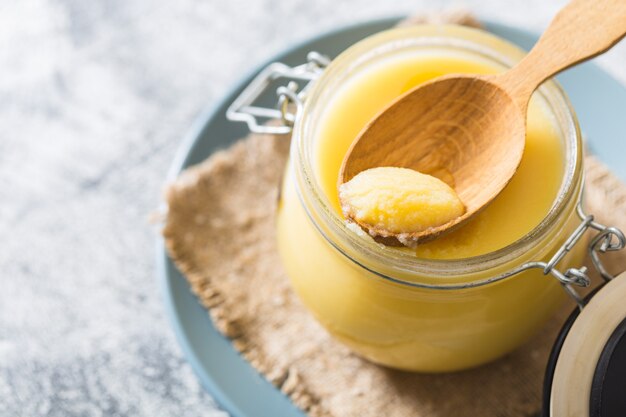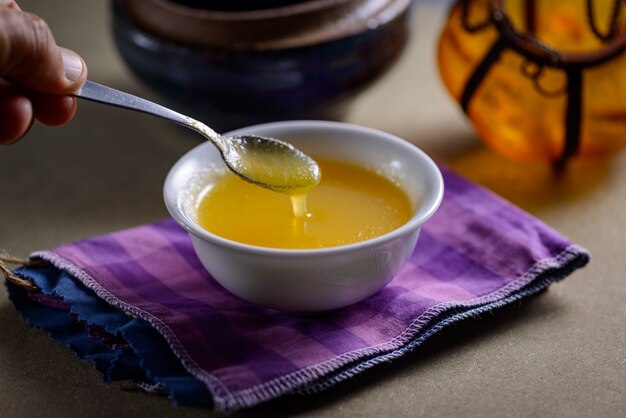Ask Ayurvedic doctor a question and get a consultation online on the problem of your concern in a free or paid mode. More than 2,000 experienced doctors work and wait for your questions on our site and help users to solve their health problems every day.
Kalyanaka Ghrita for Sleep: Ayurvedic Insights for Restful Nights

Insomnia affects millions of people worldwide, with the World Health Organization (WHO) estimating that 27% of adults experience sleep disruptions at some point in their lives. These disruptions can stem from stress, medical conditions, or even lifestyle habits. Amid growing interest in holistic and complementary therapies, Kalyanaka Ghrita—an Ayurvedic ghee-based formulation—has gained attention for its potential to improve sleep quality. But what exactly is Kalyanaka Ghrita, and does it truly help you sleep better? In this article, we explore its composition, scientific support, practical applications, and tips for usage.
Table of Contents
Don't wait or self medicate. Start chat with Doctor NOW
1. What Is Kalyanaka Ghrita?
Kalyanaka Ghrita is a classic Ayurvedic formulation predominantly composed of medicated ghee (clarified butter) infused with various herbs. Originating from traditional Ayurvedic texts, it has been traditionally used to support mental well-being, cognitive function, and improved sleep quality. Ayurvedic practitioners often prescribe this formulation to address imbalances in the doshas—primarily Vata and Pitta, which, when aggravated, can lead to insomnia or restless sleep.
Why Ghee?
- Fat-Soluble Extraction: Ghee serves as a potent carrier for fat-soluble compounds found in herbs.
- Enhanced Absorption: According to Ayurvedic principles, ghee helps transport herbal constituents into deeper tissues.
- Preservative Role: Ghee has a long shelf life, aiding in preserving the active compounds for extended periods.
2. Traditional Ayurvedic Perspectives
In Ayurveda, sleep (Nidra) is one of the three pillars of a healthy life, alongside diet (Ahara) and regulated lifestyle (Brahmacharya). When one’s sleep is disrupted, Ayurveda often points to an imbalance in the Vata dosha, which governs movement, or an excess of Pitta dosha, which can manifest as irritability or restlessness.
- Vata Imbalance: Characterized by anxious thoughts and difficulty settling down at night.
- Pitta Imbalance: Often involves nighttime awakenings, hot flashes, or vivid dreams.
Kalyanaka Ghrita aims to balance these doshas by providing grounding (due to ghee) and cooling or soothing actions (through specific herbs). While the remedy is deeply rooted in ancient practices, modern researchers are taking a closer look at how these traditional methods stack up against contemporary scientific findings.
3. Key Ingredients and Their Potential Effects
Though the exact composition can vary based on the specific Ayurvedic text or practitioner’s approach, Kalyanaka Ghrita typically includes herbs such as:
-
Ashwagandha (Withania somnifera)
- Renowned for its adaptogenic properties, helping the body manage stress.
- May reduce cortisol levels, potentially improving sleep latency and overall sleep quality.
-
Brahmi (Bacopa monnieri)
- Traditionally used to enhance memory and cognitive function.
- Could exhibit anxiolytic effects, helping calm the mind before sleep.
-
Shankhapushpi (Convolvulus pluricaulis)
- Celebrated in Ayurveda for its calming impact on the nervous system.
- May help in reducing restlessness, an essential factor for uninterrupted sleep.
-
Guduchi (Tinospora cordifolia)
- Often cited for its immunomodulatory effects.
- Some studies suggest possible neuroprotective properties, which might indirectly promote better sleep.
-
Jyotishmati (Celastrus paniculatus)
- Also known as the ‘elixir for the brain’ in Ayurveda.
- May enhance mental clarity and support emotional balance, crucial for good sleep hygiene.
These herbs, when simmered in ghee, release fat-soluble components that are believed to support mental calmness and nourish the nervous system. Although clinical research specifically on Kalyanaka Ghrita is still emerging, each individual herb has undergone various degrees of scientific scrutiny.
4. Scientific Evidence on Kalyanaka Ghrita for Sleep
Research Highlights
-
A 2018 study published in the Journal of Ayurveda and Integrative Medicine investigated ghee-based formulations for their potential in managing stress-related disorders, including insomnia. The study suggested that many herbal ghee preparations could have anxiolytic and sedative-like effects, although more extensive clinical trials are needed for definitive conclusions.11
-
Ashwagandha, one of the core ingredients commonly found in Kalyanaka Ghrita formulations, has been the subject of multiple randomized controlled trials. A meta-analysis in Cureus (2021) revealed that Ashwagandha supplementation significantly improved sleep parameters and reduced anxiety in adults.22
-
Brahmi has demonstrated mild sedative properties in animal studies.33 Its potential to modulate neurotransmitters could explain its reputed effectiveness in soothing the mind, indirectly supporting sleep.
Limitations and Ongoing Research
- Many studies lack large-scale randomized control trials (RCTs) that specifically focus on Kalyanaka Ghrita as a standalone intervention.
- Data are frequently derived from short-term observations, leaving the long-term safety and efficacy profile less documented.
- While individual herbs show promise, synergy in a ghee-based combination requires further exploration.
Despite these limitations, preliminary findings and longstanding traditional usage highlight Kalyanaka Ghrita’s potential benefits for sleep. As with any health intervention, consulting a qualified healthcare provider remains crucial for personalized advice and safety considerations.
5. How to Use Kalyanaka Ghrita Safely
Dosage and Timing
- General Dosage: Ayurvedic practitioners often recommend 1–2 teaspoons once or twice a day, but the amount can vary depending on individual needs, body constitution, and the specific product’s potency.
- Best Time to Take: Some suggest using it before bedtime to calm the nervous system. Others pair it with warm water or milk to enhance absorption.
Administration Tips
- Under Professional Guidance: Seek advice from a certified Ayurvedic practitioner or a healthcare professional familiar with integrative medicine.
- Pair With A Balanced Diet: Since it is ghee-based, consider balancing your daily intake of fats.
- Lifestyle Integration: Combine usage with mindfulness practices, such as gentle yoga or meditation, to optimize results.
6. Possible Side Effects and Precautions
While Kalyanaka Ghrita is generally considered safe when used correctly, here are some caveats:
- Allergic Reactions: Individuals with dairy or specific herbal allergies should practice caution.
- Digestive Upset: Excessive consumption of ghee can lead to digestive issues like bloating or diarrhea, especially if you’re not accustomed to high-fat diets.
- Medication Interactions: Herbs like Ashwagandha can interact with sedatives or thyroid medications. Always consult your healthcare provider if you’re on prescription drugs.
- Pregnancy and Breastfeeding: Limited data exist on Kalyanaka Ghrita’s safety in these populations. It is imperative to seek medical advice before use.
Disclaimer: The information provided here is educational and not meant to replace professional medical consultation. Always discuss new supplements or herbal remedies with a qualified healthcare professional.
7. FAQ: Kalyanaka Ghrita for Sleep
Q1: Can I take Kalyanaka Ghrita with other sleep aids?
A1: While many people combine Ayurvedic remedies with modern sleep aids, it’s crucial to consult your healthcare provider to avoid potential interactions or side effects.
Q2: How long does it take to see results?
A2: Individual responses vary. Some notice improvements within a week, while others may require longer periods—up to several weeks—to experience consistent benefits.
Q3: Is Kalyanaka Ghrita safe for children with sleep disturbances?
A3: Traditional Ayurvedic texts sometimes suggest small, tailored dosages for children. However, due to a lack of extensive pediatric research, it’s recommended to seek professional advice first.
Q4: Does Kalyanaka Ghrita also help with anxiety and stress?
A4: Many of the herbs in Kalyanaka Ghrita, such as Ashwagandha and Brahmi, have been studied for their anxiolytic effects. Reduced stress can, in turn, lead to better sleep.
Q5: Where can I find authentic Kalyanaka Ghrita?
A5: Reputable Ayurvedic pharmacies and certified online retailers often carry genuine formulations. Look for brands that provide third-party testing or quality assurance.
8. Conclusion and Call to Action
Kalyanaka Ghrita stands at the intersection of traditional Ayurvedic wisdom and emerging modern research. Its carefully selected herbal ingredients, combined with the nourishing base of ghee, make it a compelling option for those seeking a holistic approach to sleep disturbances. While the scientific community still calls for more large-scale, high-quality studies to substantiate its efficacy unequivocally, the collective evidence—alongside centuries of anecdotal validation—positions Kalyanaka Ghrita as a promising tool in sleep management.
Ready to explore a new avenue for sleep support?
- Consider discussing Kalyanaka Ghrita with a qualified Ayurvedic practitioner.
- Combine its use with lifestyle changes—like stress management, gentle exercise, and a nutrient-rich diet—to maximize potential benefits.
- Keep an open mind to both modern research and traditional perspectives for a balanced approach.
If you found this article insightful, please share it with friends, subscribe to our newsletter, and leave a commentabout your experience with Kalyanaka Ghrita or other Ayurvedic sleep aids. Your feedback and questions help us continue delivering reliable, well-researched health information.
References & Further Reading
Journal of Ayurveda and Integrative Medicine - Cureus Meta-Analysis on Ashwagandha and Sleep
PubMed Study on Brahmi
Disclaimer: This article is for informational purposes only and does not substitute for medical advice. Consult your physician or a qualified healthcare professional for personalized recommendations.



